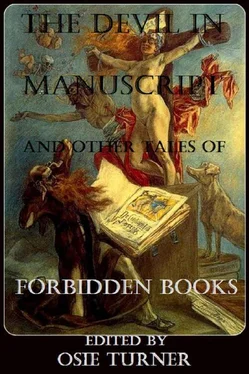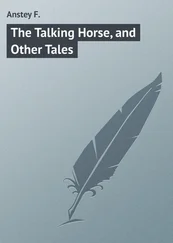“No,” I answered, at a loss for his meaning.
“Then why all this?” he asked, pointing at my black clothes. “And why is it that we can’t rattle along the streets at a livelier pace?”
“Custom,” I explained.
“Custom be damned! The decent, sensible thing is to hide one’s inner feelings from the world—not to parade them through the streets, as we are doing now, for the mob to gibber at. A funeral procession is a relic of barbarism; and there goes another.”
We were entering the cemetery as he spoke, and the dull tolling of a bell rang out on the still air. Like the beating of a grief-stricken heart, solemnly, sadly, it uttered its message of misery to the living. And on every side, where tiny crosses held out their weary arms, where tombstones seemed kneeling phantoms, where long flat slabs of granite crouched like lizards, a sad echo seemed to rise and steal away on noiseless wings.
“All this,” Huntington continued, “your friend Martin would very truly call toys made for the massmind. They hide true feeling and, like wine, intensify the emotions. But here we are.”
“Poor old Paul!” I murmured.
The carriage came to a halt and we got out. Soon a number of my brother’s friends assembled at the open grave and the simple service was well under way. Once, moved by an unaccountable impulse, I turned my head and saw Martin standing directly behind me. His face was as expressionless as though it had been hewn out of marble; his bloodshot eyes were staring straight at the coffin.
At last the ceremony was over. Now two men were filling up the grave with damp earth which fell on the lid of the casket with a dismal, reverberating sound. It was at this moment that I heard Martin speak in a low, muffled voice which seemed to come from deep down underground.
“It is done!” he murmured.
“What is done?” I asked in a low voice. “Surely, for Paul, it is just the beginning.”
“I have buried my heart with your brother,” he said.
But there was a strange exultation in his tone which scarcely tallied with his words. I saw Huntington glance at him curiously.
After Paul’s funeral, Martin passed out of my life completely. Occasionally Rupert Farrington would refer to him in glowing terms and prophesy that he would soon startle the world with another gruesome masterpiece. But, at these times, I was careful to lend a deaf ear to his eulogies.
Poor Farrington! I grew very attached to him as the years went by. He was one of those unfortunate mortals who have the inclination to do big things in art and yet never have the ability to perform them. A tongue-tied dreamer, he would have starved years before, if his father had not sent him a generous allowance. And it was a pitiful thing to see him circling round and round the flame of genius with no hope of gaining the inner sanctuary—a poor moth doomed to outer darkness, struggling for recognition till his wings were singed.
Day after day he fought valiantly to compose one stirring line; day after day, bitter disappointment was his lot. Like many another man of his type, he could not criticize what he had written. To him, each poem was good—perhaps a masterpiece. The editors were at fault. They could not recognize genius when they saw it. Hatred of them had become an over-mastering obsession. He would rail against them till he grew purple in the face.
I remember distinctly one Christmas morning, a month before Martin’s second book came out. Rupert broke in on me while I was having breakfast, his eyes wild and staring, his face suffused with blood. Stamping up and down the room, he gave vent to such a blind, ungovernable fit of fury that I feared for his reason.
“What’s the trouble?” I asked when I could make myself heard.
“Trouble?” he fairly shouted. “Trouble? I’d like to wring his damn neck!”
“Whose neck?”
“Why, Hubbard’s neck—Hubbard of the Firefly.”
“What’s he done to you?” I asked mildly.
Farrington came to an abrupt halt and fixed his blazing eyes on my face. “I’ll tell you what he’s done,” he said in a voice which he attempted to make calm but which trembled on a sob. “Do you remember my last poem, ‘The Sea Gull’? Well, it was a pretty smooth’ piece of work, although you didn’t seem to appreciate it.”
“What has ‘The Sea-Gull’ got to do with Hubbard?” I inquired.
“I sent it to him for his magazine,” he answered bitterly. “That was a month ago. They’ve had it ever since. I thought that I’d landed something at last. What’s today, Smithers?”
“Today? Why, it’s Christmas morning.”
“To be sure—Christmas morning! Well, I got it back in the first mail, tied up with red ribbons. Now maybe you think that’s a joke, Smithers—a damn good joke?”
“No, I don’t,” I hastened to assure him.
“Well, I don’t either,” said Farrington grimly. “I’ve worked too hard for that. It seems to me a contemptible thing to do—a low-down, contemptible thing! To keep it so long that I had hope and then to send it back tied up with red ribbons on Christmas day! I wish I had him here, that’s all! I could beat him to death without the slightest compunction. A man who would do such a thing, should be beaten to death! Why, Smithers, I tell you it”
“But how do you know that Hubbard is responsible for this?” I broke in. “It sounds more like one of his office force to me—some silly little stenographer playing a practical joke.”
But Farrington shook his head stubbornly. “No, it was Hubbard—undoubtedly it was Hubbard. It’s his kind of humor. Have you ever seen the man? Have you ever talked to him?”
“No.”
’’Well, he’s a pompous jelly bag with a silly, secretive smile—a sly man and a cruel man, a man who sits in his office like a round-bellied spider waiting to pounce on the flies. He makes game of us, Smithers—we poor fellows who try so hard and get so little! But he and his kind are driving me too hard! There are things that I won’t stand, things that”
“I think you’re mistaken, Rupert,” I broke in. “Calm yourself. This magazine proposition is driving you dotty. What possible reason could Hubbard have for doing such a thing?”
“Oh, just a little recreation,” Rupert muttered. “His humor has to be tickled ever so often. But he’s driving me too far, Smithers—a damn sight too far!”
I did not see Farrington again for several days. I was called out of town on an important business engagement; and when I returned, it was to find that he had gone home for the weekend.
One night, ten days later, I walked past his door and noticed that it was ajar. Glancing in, I saw Rupert seated in his favorite rocking chair. As usual, when alone, he wore a faded brown smoking jacket and crimson worsted slippers. But tonight there was something incongruous about the man which drew my attention. Perhaps it was the rigid way he sat, or perhaps it was natural curiosity to learn what had transpired since I had seen him last, but something prompted me to enter. Glancing at him again, as I did so, I noticed a volume bound in red morocco resting on the arm of his chair.
“Rupert,” I said, “what have you been doing with yourself?”
But he did not answer me. Silent, immovable, he sat staring into space.
“What’s the matter with you, Rupert,” I said in a louder tone. “You’re not sick, are you?” I bent forward and touched him on the shoulder.
At that, he started and looked up. His eyes were bloodshot, the veins on his forehead were black and bulging, his thick red lips were extended in an animal pout.
“What’s the trouble?” he said thickly. “Is that you, Smithers?”
By this time I was thoroughly alarmed. “You’re not sick, are you?” I repeated, shaking him by the arm. “What’s the matter, Rupert?”
Читать дальше












